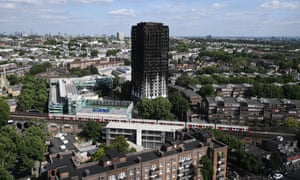Actor and director Kathy Burke will always mark the anniversary of the Grenfell fire, partly through coincidence: 13 June is her birthday. In the very early moments of the 14th last year, as the fire took hold, she was on the other side of London, celebrating with friends. As she got into bed, just after 1am, she checked her phone and saw the first pictures of the blaze that would kill 72 people, then just beginning to creep up from the fourth floor.
“It was just so shocking,” Burke says. “This bloody tower block – it was devastating. We just sat there in the morning, for a good two hours, open-mouthed, watching the news.”
Like many other Londoners, Burke spent the days that followed veering between righteous fury and grief for the victims. Burke grew up in council housing herself, in a 1920s tenement in Islington, north London, not far from where she lives today. “They were sort of nice,” she says. “We had a nice bit of green out the front. I had mates who lived in tower blocks and I always hated seeing them, because of the lifts, y’know? My God, so scary. It was similar to Kensington, because the very rich and the poor lived side by side.”
Then came a fortuitous tweet. Paul Jenkins, someone Burke followed on Twitter (“because he’s very sweary, very angry, and I like that”), sent her a message. He had been speaking to Rhona Martin, a woman who lived with post-traumatic stress disorder (PTSD), and was worried about the survivors. Could they help?
Mountains of food, clothes and toiletries were already piling up in town halls and churches. “We knew donating stuff wasn’t going to help, because they had too much. We had to look at the bigger picture, what we could do for the future,” says Burke.
Jenkins and Martin suggested a book: 24 Stories, one for each floor of the tower. Twelve would be written by well-known authors – including AL Kennedy, Meera Syal, John Niven and Irvine Welsh – and 12 by newcomers. All were given the broad remit of hope, community and positivity. “We didn’t want it to be full of dark, depressing stories. We wanted it to be as uplifting as it could be,” says Burke.

Only two of the stories mention Grenfell, the most explicitly connected being “Singing in the Dark Times”, Pauline Melville’s story of a homeless man navigating London after the tragedy. The other pieces are united by their shared humour and tenderness; even Welsh, not known for “uplifting” writing, contributed “Seventeen-Storey Love Song”, about a woman falling off a New York rooftop – and yes, it does have a happy ending.
“I remember watching the news for hours with my kids,” says Nina Stibbe, who contributed “The Language of Flowers”. “We were all devastated, by the idea of people dying in their flats. They still can’t stop talking about it. When we go to London, they ask, ‘Will we see that tower?’ It is deeply, deeply symbolic for people.”
Two weeks after Jenkins messaged Burke, 24 Stories was launched on the website of the crowdfunding publisher Unbound; in four days, the project was fully funded (with the help of JK Rowling and Gary Lineker); within another three weeks, they had 500 stories competing for the 12 newcomer spots. Burke, who was casting two plays at the time, helped whittle down a longlist of 60.
Burke’s career has taken many surprising directions. She performed in 90s TV comedies Absolutely Fabulous and Gimme Gimme Gimme and starred in acclaimed dramas such as Mr Wroe’s Virgins and Gary Oldman’s film Nil by Mouth. At one point she quit acting altogether. In the theatre she recently directed Oscar Wilde’s Lady Windermere’s Fan and Sam Bain’s The Retreat, and she has writing credits to her name – so perhaps book editing is not such a great leap.
All profits from 24 Stories will go to the Trauma Response Network, a charity set up after the Manchester bomb attack last year. “The survivors of Grenfell lost their homes, en masse, through no fault of their own,” writes neuroscientist Dean Burnett in the introduction to 24 Stories. “Many of them lost friends and loved ones, too, at the same time. They ended up with nowhere to go, no resources to fall back on and at the mercy of a system that clearly didn’t care and, from what we can see, still doesn’t. Not to have some form of PTSD would be more than unlikely – it would be borderline miraculous.”
Burke is aware that her support of the charity may be construed as self-promotion, she says; some celebrities were criticised for turning up in the aftermath, even with offers of money and donations. Stibbe feels the same: “I was a little nervous about getting involved, because you think, ‘Who am I to talk about this?’” she says. “People are going to say, ‘So, what have you done?’ I’m a writer. Kathy is a writer, actor and director. We do what we can.”
“This was a great idea and we just ran with it,” Burke says, firmly. The hope, she says, is that people will buy it and fund the survivors’ treatment – and be reminded of what happened every time they glance at their bookshelves. “Seventy-two people died,” she says, “but hundreds of people are going to have to live with it for the rest of their lives” •